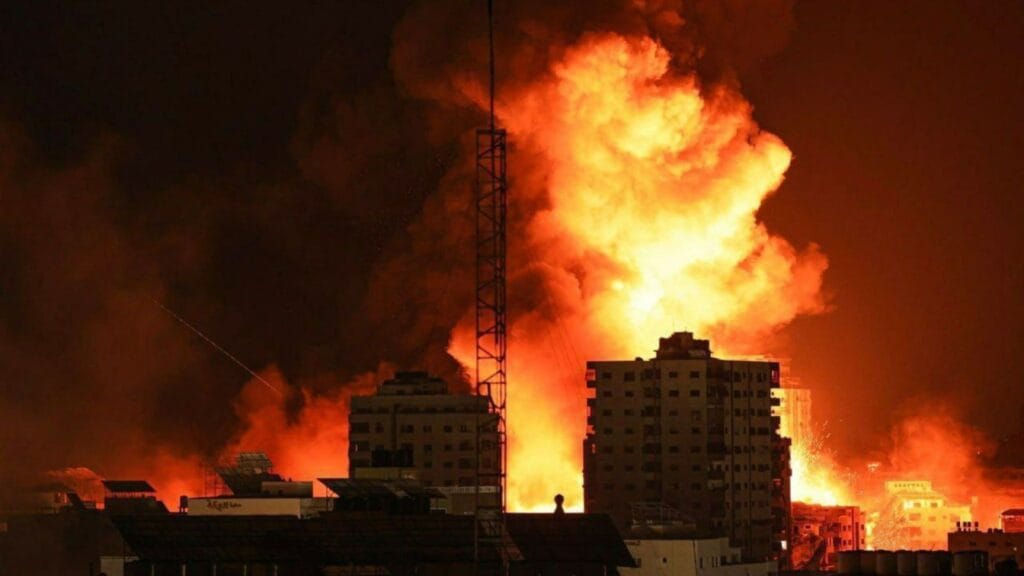War is lived in numbers, the destruction it causes people killed, cities destroyed, and economies wiped out. But what is the other impact, that hidden, enduring cost to our planet? From raging wildfires in battlefields to polluted waterways and scorched fields, war leaves an indelible mark of environmental degradation, accelerating climate change. Ever wonder how the battles over oil, land, and resources translate into the air you breathe? Or how science might step in and heal those invisible scars on our world?
As the climate landscape changes before us, the truth behind warfare and our environment has never been more relevant. In this article, we’ll expose some of the stealthy ways that warfare fuels global warming and pollution, then find out how science is the most potent tool for progress and can undo them. How can we mend our world rather than break it further? Let’s take the astonishing link between war and climate and proceed to see the contribution of science toward a more peaceful and sustainable future.
What’s the Impact of Wars on the Environment?
War’s immediate impact is clear in the destruction it leaves behind, but the environmental toll goes much deeper than that, contributing highly to climate change. Conflicts mobilize vast amounts of resources and unleash pollutants into the environment. Most of the war machines are guzzlers of fossil fuel-big-war machines from fighter jets to tanks-extracting, in great quantity, massive amounts of fossil fuel to produce greenhouse gases. The U.S. Department of Defense is, in one study, one of the largest institutional consumers of fossil fuels in the entire world and is rivaled only in many other military operations around the world. Every military engagement increases the warmth of our planet and fuels the climate crisis.
Warfare also devastates ecosystems and worsens climate change in another way, Bombings and explosions often destroy habitats, forests, and farmland, causing extreme soil degradation and water pollution. A telling example of such an impact is the result observed in the Middle East where continued conflicts have resulted in water scarcity, desertification, and a difficult life for humans as well as wildlife. Dr. Vandana Shiva, an environmental activist says,
“The wars in the world today are not just over land and resources, they’re over the future of life itself.”

Then there’s the meaning to her words, environmental impacts have effects far beyond borders, on global climate patterns and the threats to biodiversity.
Chemical weapons poisoning and neutralization also contaminated the atmosphere, soil, and water, remaining lethal for years. This does not end there, however, poisonous pollutants could travel thousands of miles, contaminating the world’s ecological system and human and agricultural life. From landmines messing up local biosystems to aerial and water pollution affecting civilians, war’s ecological footprint is enormous, and thus the demand for scientifically motivated solutions is necessary.
How Can Wars Contribute to Climate Change?
The environmental impacts of conflict are increasingly impossible to ignore, especially as more climate patterns shift and more frequent and intense natural disasters appear around the globe. The impact is no longer confined to war zones, it now feeds a more volatile, warming planet. Every year, millions feel the ripple effects from changing temperatures to extreme weather events.
For example, in India, I noticed a jarring disconnect this time of year with our festivals of Diwali and Chhath Puja. It was when they announced the coming of winter in my childhood, and the first signs would be when we started pulling out sweaters and blankets. This time, we celebrated as usual, but there was an unsettling warmth. We’d have huddled under the cool winds of winter, but tonight, we lie asleep with the fan on and air warmer than usual. Unsettling, how climate change is changing the fabric of seasonal patterns. Guess one wonders, how much of this is because of the less-than-visible impacts of global conflicts and climate negligence.
Change has taken place before my eyes, and with it came a far bigger message, climate change is no abstract notion, it’s a harsh reality affecting lives, traditions, and our common tomorrow.
Nobel Laureate Wangari Maathai once said,
If we destroy nature, we destroy ourselves.
This rising heat isn’t just an annual nuisance, it’s the damage done by the accumulation of unchecked environmental degradation and human conflict as they ravage everything in their wake. But much higher are the stakes, and science holds out hope.
Who is Affected and Who is Working on Solutions
Do not forget, that wars have the worst consequence, killing innocent civilians in the process of losing their homes and futures. The environmental impact of war does nothing but worsen losses: millions of people around the world especially those in regions that are already vulnerable. War-related pollution pollutes water sources, degrades the soil, and lowers the level of air quality in communities that are already being battered by one-sided conflicts. The agricultural land would become desolate, leaving, once again, the civilian population without a source of food and livelihood in the post-conflict period.”.
Beyond the raw loss, residual impacts from war extend geographically and across international boundaries. People on the other side of the world, thousands of miles removed from local conflict areas, are subject to the ripples of climate change, fueled by war. These individuals are subjected to increasingly severe weather patterns, changed seasons, and sources of resources. The ripple effects can be found in Central Asia or the Middle East, for example, as disruptions to vital resources for water have wrecked agriculture and sources of clean water for tens of millions of individuals.
It’s harder to make peace than wars.
Atul Raj
Amidst this depressing reality, however, there are still several organizations and scientists who are now coming up with solutions up their sleeves. Now, there are studies of post-conflict environmental rehabilitation directed by environment NGOs, climate researchers, and institutions for peacebuilding. Organizations, such as the United Nations Environment Programme (UNEP), even put forth initiatives that focus on replacing the environmental damage brought about by war with real projects that restore ecosystems and promote sustainable development.
Scientists all over the world are studying methods through which military operations can be environmentally friendly and ways in which the land and water degraded by war can be rehabilitated. The growing liaison between environmental scientists and peace organizations does not appear to promise better results in dealing with such problems in an integrative manner so that science works as a healer and reconstructive agent.
Timing and Global Scope of the Issue
Warfare’s impact on the environment has never faced its urgency in our future when we are observing an increasing trend of global warming and wild climate events. The influences of wars on climate change cannot be local or regional, it is a global issue that disturbs the earth’s balance. For example, such wildfires that are conflict driven, release enormous amounts of carbon within the atmosphere, making global warming take place at a pace faster than before. With those changes happening along with higher greenhouse gases, it often increases heat waves and forest fires, as well as extreme cold spells.
This is important now more than ever given the nature of the ongoing conflicts in different regions. Whether within Europe, the Middle East, or even Asia, the ongoing conflicts contribute to the additive effects of environmental degradation. These phenomena are occurring on a global level, thus necessitating immediate and collective action. Solutions would demand countries agree on the fact that such conflicts’ impact goes beyond borders.
Sometimes, war may seem inescapable, but it always leaves a blunt reminder: the costs are not just only diplomatic and territorial claims, it changes the climate and wrecks our shared environment. For us, we only have one alternative if we want to save our Earth, bring together science and diplomacy to try and break this cycle and help focus more on peace rather than war.
How We Can Preserve the Future—Lessons from Small Nations and Technological Societies
For most of the developing countries, it is their decisions made now regarding sustainability and economic growth that will determine whether they can achieve a balance between both economic growth and environmental concerns. Small nations, on the other hand, appear as prime examples of how high standards of living are maintained with minimal loss of resources. Finland, Sweden, and Norway are solidly embedded in a consistent list of the happiest and healthiest countries, featuring high life expectancy, clean air, abundant fresh water, and a strong happiness index. The countries regularly act as examples of environmental sustainability, because the human-nature relationship is well-balanced, on both governmental policy and public awareness levels.
But what makes them achieve so much compared to the world superpowers like the USA, Canada, India, the UK, France, and Russia? The answer lies in a combination of proactive environmental policies, effective governance, and cultural values that they have in place. For instance, Norway has invested in renewable sources, particularly hydropower to meet most of its electricity needs. Similarly, Finland remains very celebrated for their tree management practices that protect vast woods and, at the same time, improve the timber production industry. Thirdly, all three countries maintain public education in sustainability. This ensures that the people within a given nation become a culture of protecting the environment.
For instance, while more industrialized countries face the challenges of pollution, unsustainable consumption, and complex geopolitics, these lesser nations avoid those possibilities through policies that promote reduced carbon emissions and support green technologies, and biodiversity. The well-being and health of the people rank higher as they increasingly come into contact with nature.
These prove that maintaining very high living standards without harming the environment is not only possible but also improves the overall happiness and quality of life of their citizens. Their success holds critical lessons for larger, more resource-heavy nations on how to implement policies that encourage sustainable development and environmental responsibility without compromising economic growth.
Much is learned from the like-minded countries of Japan and China, which have been able to retain much of their culture as well as their linkage with nature while embracing the newest technologies. Japan, for instance, emphasizes the eco-friendly use of technology, something it sets forth as a slogan with green cities such as Tokyo, where public transportation is very efficient, and electric vehicles come fast like electricity into people’s everyday needs.
The country also harmonizes more traditional cultural practices with modern innovation, further promoting a way of life that harmonizes with nature. Another country that is very rapidly taking a leading position in harnessing solar energy technology is China, which has made significant commitments to very aggressive environmental goals. These nations demonstrate it is possible to be very technological while truly in harmony with the environment essential balance for future generations.
But by embracing some of these practices better resource use, renewable energy, and those aspects that culturally respect nature we will become closer to the future when technology and tradition look toward a better world for all.
Conclusion: A Call to Action for a Sustainable Future
The climate crisis has been intensified by war and conflict as one of the very biggest challenges that face mankind today. For environmental war victims, this includes pollution up to biodiversity loss. However, the evidential examples noted above of countries such as Finland, Sweden, and Norway, among other things, together with the technological advancement from Japan and China dispel the notion that an imbalance between nature and technology cannot be achieved. We can learn from these countries and adapt various practices that may help us preserve our environment while also progressing economically and technologically.
But it is not just what the governments and large organizations can do, we all can. Whether we are cutting down our carbon footprints, promoting policies for sustainability, or funding innovations that bring peace and sustainability, we are all part of this new world.
Now, what do you think about this? Have you noticed any changes in the view outside your windows because of climate change or conflicts in other parts of the world? Let us know your story or thoughts in the comments section.
If you liked this and want to receive more articles like this, keep reading. We will continue to publish more thought-provoking science content on geopolitics and sustainability. Keep in touch with us on social media and be part of the conversation. Together we can change the way things are.
Analysis by Atul Raj






